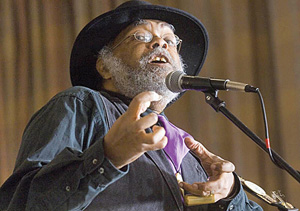Storytelling Moves to Center Stage
Molly Moore | December 21, 2011 | 1 Comment
According to Gary Carden, the Scot-Irish people of Appalachia don’t communicate in dialogue. They communicate in stories.
“When I was a child, [storytelling] was called lying,” Carden says. A renowned storyteller, Carden was raised by his Scot-Irish grandparents in the Balsam Mountains of Western North Carolina.
Carden recalls a childhood scene from his great-grandmother’s funeral, where her daughter Elsie was overwhelmed with grief. Elsie pulled the corpse upright from the coffin and held her. “We’ll never look on her sweet face again!” she cried, and collapsed over the coffin. Carden remembers a similar display from Elsie at the next family funeral and his grandfather telling his grandmother, “If you would, see if you can keep it a secret when I die. I don’t want Elsie to know.”
Most of Carden’s stories come from tragic experiences that have acquired humor over the years. “If you’re blessed or cursed with an exceptionally disastrous life, that’s great material,” he says.
Nearly two years ago, Carden formed a group called the Liars’ Bench to revive the casual, tale-telling atmosphere of small Appalachian towns. Their storytelling programs have moved to an auditorium at Western Carolina University’s Mountain Heritage Center in Cullowhee, N.C., and even with the auditorium’s 92 seats and crowds standing in the hallway, each event has still turned people away.
The popular Liars’ Bench programs aren’t the same as stories told during the winters of Carden’s childhood, nor are they quite like the National Storytelling Festival in Jonesborough, Tenn., or the hip Synergy Story Slams in Asheville, N.C. Instead, their stories, music and visual presentations study a regional theme. Carden hopes future Liars’ Bench sessions will cover topics such as the last hanging in Webster County, N.C., and local lore surrounding a charismatic Cherokee chief from the 1950s.
Just down the road from Gary Carden on the Qualla Boundary — the Eastern Band of Cherokee Indians’ reservation — traditional tales are also moving into the spotlight. This summer, regularly scheduled storytelling sessions were held at a bonfire at Oconoluftee Islands Park and, near Halloween, the tribe held its first Myths and Legends Tour, featuring contemporary and ancient haunted tales.
“In a couple generations there has been a huge renaissance in storytelling and in passing [traditional] information along,” artist and storyteller Davy Arch says. Some stories remain underground, such as tales that refer to sacred medicine or contain gender-specific information. But general folk tales from Cherokee, European and African traditions are resurfacing.
Growing up, acclaimed storyteller and folk musician James “Sparky” Rucker’s family was closely tied to Knoxville’s African-American Church of God. As a child, Rucker would listen as his father’s large family told stories over supper. At annual memorial services for his grandfather, a prominent bishop in the church, he heard humorous “preacher tales” poking fun at the people in power. Older folks in the community shared Brer Rabbit tales, African-American stories that date to the days of Aesop’s famed fables which were merged with Cherokee “trickster rabbit” tales during slavery.

James “Sparky” Rucker was a musician before he was a storyteller. He tired of simply playing songs during concerts and began to tell audiences the song’s history. “The explanations got longer and longer to the point that I was sometimes doing a 15-minute introduction to a three-minute song,” he says.
“The fundamentalist preacher’s role is to give the people a sense of mystery, that there’s something beyond their meager lives,” Rucker says. “And that’s what the storyteller is for, too. As I often tell audiences, these old folk tales and these old folk songs, these are the words of your ancestors being spoken directly to you.”
Those audiences are growing. Some, like Carden, are concerned that the popularization of storytelling is drawing the form away from a poignant blend of humor and tragedy and toward a stand-up comedy future. But Saundra Kelley, editor of Southern Appalachian Storytellers: Interviews with Sixteen Keepers of the Oral Tradition, isn’t worried.
“People need humor right now,” Kelley says. “A storyteller can give that to you while they teach you a life lesson that you might never had heard any other way.”
Like this content? Subscribe to The Voice email digests
March 26, 2024
Garret Mathews
1054 Second Avenue NW
Carmel, Indiana 46032
garretmath@gmail.com
317-506-6102
I hope you’ll look at my 17-minute video on backwards-speller Norris McElmurry from rural Burna Ky., one of the most interesting characters I interviewed in 39 years of writing columns and features for the Bluefield, W. Va., Daily Telegraph and the Evansville, Ind., Courier & Press.
Go to YouTube and search for Norris and backwards-speller. We shot the video in 2018. He died two years later.
I also hope that you’ll want to help preserve Norris’ contribution to American folklore – and storytelling – by sharing the availability of the video.
I think the video would benefit beginner interest in Appalachia because of its humor and brevity.
So who am I? The IndyStar interviewed me not long ago for my ability to juggle a 16-pound shot put and two bean bags. You can Google the video.
My legacy website — https://www.pluggerpublishing.com – includes links to some favorite columns, my interest in the civil rights movement and a collection of Appalachian feature stories (Folks Are Talking) I wrote while in West Virginia. At the latter link are interviews with long-gone coal handloaders, men who shoveled in low coal and early UMW organizers.
I have written a half-dozen or so plays that have been staged in the Indianapolis area. This material can be accessed at garretmathews.com
Thanks for your kind attention.
Garret Mathews